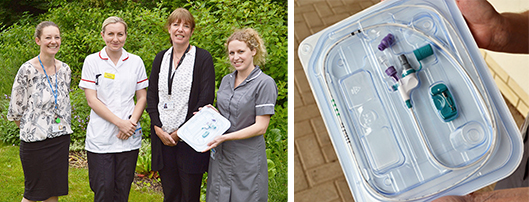Media Release
Date: 9 June 2022
RUH takes leading role in groundbreaking Stroke research study
A new research programme aimed at helping stroke patients to recover the ability to swallow again is taking place at the Royal United Hospitals Bath NHS Foundation Trust.

The RUH is the first trial site in the country to go live with the study and one of only two sites taking part in the South West.
The PhEAST study aims to help stroke patients who are unable to swallow food and drink to re-train their brain so that they can swallow independently again.
The study uses special nasal gastric tubes, which are used to feed patients, fitted with tiny electrodes. The electrodes are used to deliver short bursts of current directly to the muscles and nerves that are used for swallowing.
It is hoped that by stimulating these nerves, the electric current will help to re-programme the swallowing centres in the brain. The stimulation can barely be felt by patients.
A stroke can cause swallowing problems in half of patients, many of whom still have abnormal swallowing a year later. Swallowing problems lead to chest infections, poor nutrition, the need for a feeding tube inserted into the stomach, long hospital stays and disability.
Having a long term feeding tube reduces quality of life and adds to the physical, mental and emotional cost of stroke.
Emma Paulett, a speech and language therapist at the RUH who is helping to run the research, said: "We are delighted that the RUH has been chosen to take part in such an important piece of research, which we hope will make a really positive difference to the recovery of stroke patients.
"This really is a groundbreaking study which will be using the very latest in medical technology to benefit some of our most seriously ill patients.
"The RUH already has an excellent reputation for its research, and it reflects very well on the Trust that we are the first trial site in the country to go live with such an important study."
The study is being led by Professor Philip Bath from the University of Nottingham and the special tubes being used for the research are being supplied by Phagenesis Ltd (Manchester, UK).
ENDS

